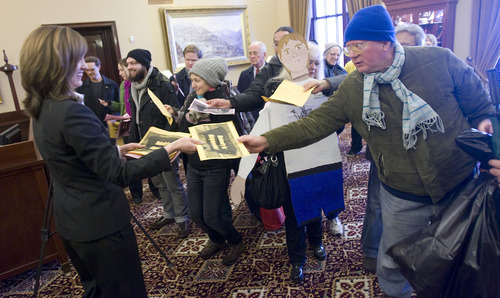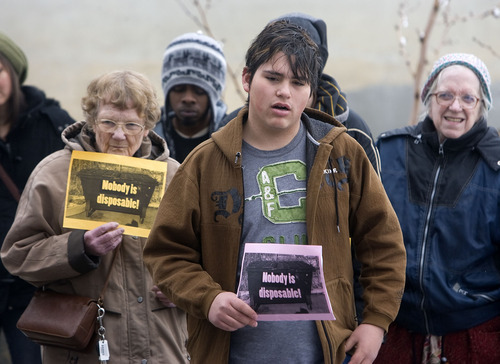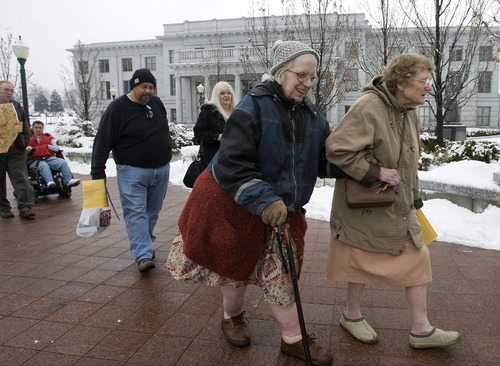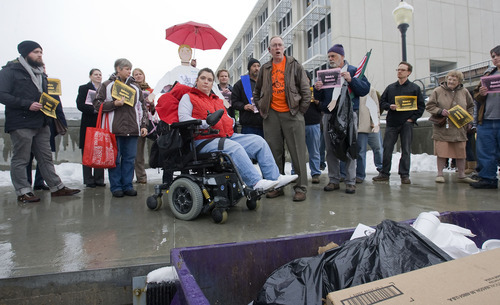This is an archived article that was published on sltrib.com in 2011, and information in the article may be outdated. It is provided only for personal research purposes and may not be reprinted.
As Utah lawmakers kick off the 2011 session, the state's social service advocates are waiting to see if a $48 million budget hatchet falls in the weeks ahead.
That's the possible cut for social services in a GOP House plan to wipe out more than $300 million in spending.
Protesting the possible reductions, advocates gathered Tuesday at a dumpster where leftovers from lawmakers' lunches are tossed, waving signs that said, "Nobody is disposable." Disabled, low income and other Utahns in need take the budget hit too often, they argued.
In South Jordan, 28-year-old Justin Lay hopes to keep the job coach the state provides to help him work at the food court of a local theater. And maybe, he adds, he can transfer to the job he really wants: selling tickets at the window.
"I want to work my way to the box office, if someone can help me learn what to do," said Lay, who faces the daily challenges of life as an autistic adult.
Lay is among 55 mentally or physically challenged Utahns taking part in a supported employment project that some state officials believe has improved lives and reduces the disabled's long-term dependency on taxpayer dollars as they try to integrate into the workplace.
But with the program among the possible cuts, Lay's aspirations are tied in part to what happens under the rotunda in the months ahead.
The program is sponsored by the Division of Services for People with Disabilities [DPSD], an agency facing more $3 million in optional cuts presented by the Office of the Legislative Fiscal Analyst.
"This is more than challenging. This is devastating," DPSD Director Alan Ormsby said about the breadth of the list, which includes losing 64 employees who oversee disabled adults working at the Utah State Developmental Center.
Ormsby points out the division is a regular target for cuts. It has a staff of 120, half the employees it had when Ormsby took over as director in 2008, as the national recession began.
Budgets for other Health and Human Services areas could be reduced as well, including more than $2 million cut from mental health services for children and adults who are not eligible for Medicaid.
At Tuesday's rally, Jerry Costley, executive director of the Disabled Rights Action Committee, objected, "They are talking about turning the clock back, and saying once again that we are disposable. They are looking at taking away community services, so that we'll have to go into nursing homes, so that we'll have to be warehoused once again."
Parker Gibson, 19, who is homeless, said, "They would cut many of the services that I use every day. They are already hard to obtain.... Now is not the time to cut."
Lou Anne Stevenson, a board member of the Anti-Hunger Action Committee, noted that the poor with Medicaid coverage have already lost vision and dental care. "I have to use dollar-store reading glasses, and they don't work very well. It would be very nice if they would restore vision — but they are talking about more cuts."
After the press conference, about two dozen activists walked to Gov. Gary Herbert's office to drop off personal notes from poor Utahns.
Legislative leaders said they are trying to deal with tough budget realities.
"I don't argue that there are people impacted and hurt," said Senate Executive Appropriations Committee Co-chair Lyle Hillyard, R-Logan, adding, "I have a practical reality. I only have so much money and I don't print it. So I just have to take money from someplace else... People in the state of Utah are just not interested in a tax increase.... They are hurting."
Senate President Michael Waddoups, R-Taylorsville, said the state has a "structural imbalance" — relying on one-time-only revenues, such as from federal stimulus money, to fund ongoing operations — of $313 million. So agencies have been asked to see what they would do if a 7 percent spending cut were ordered to replace the one-time money in the future.
Sen. Allen Christensen, co-chairman of the Social Services Appropriations Subcommittee, said legislative leaders expect all committees to offer their share of ideas for cuts.
Christensen, R-North Ogden, said he is well aware of the people who could lose services or the number of state employees who could lose their jobs if cuts presented by the legislative analyst are adopted.
"This results in a reduction of 272 full time employees...some strong cuts," Christensen said.
But there is a chance the cuts won't happen, as Herbert battles with lawmakers over their push toward the 7 percent cut. Herbert wants to use the state's rainy day fund and keep budget appropriations level.
Laura Lay, Justin's mom, hopes lawmakers keep the job coaching program, one element in his tenuous connection to the world around him. As she works full-time and attends school, she is frustrated to see her son struggle to survive in the work world.
"Every time, it seems like they target people with special needs for cuts," said Laura Lay.
Back at the South Jordan concession stand, Lay said he just aspires to be a box office champion, with or without the state's help.
Tribune reporter Lee Davidson contributed to this report. —
2011 session budget debate
Gov. Gary Herbert and Republican lawmakers have dueling plans for trimming the state budget by $313 million.
GOP plan: 7% cut
Herbert's plan: Tap the state's rainy-day fund to keep funding level and speed up tax payment deadlines for self-employed Utahns to add $130 million to the coming budget year.









